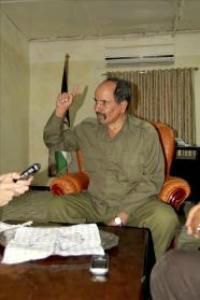 The trial of the Gdeim Iizik case that wound up last Sunday before a Rabat Court provided the Polisario with an unexpected opportunity to resort anew to its appalling tactics. The verdict rendered by the Rabat Military Court has however been devastating for the leadership of the Algeria-backed Polisario which is claiming the independence of the Western Sahara. The 24 individuals who were sued for the murder of eleven Moroccan security enforcement agents on November 8, 2010, during the dismantling of the Gdeim Izik camp near Laayoune, were handed out sentences ranging from 2 to 30 years in prison, while nine of them including one who is on the run, were sentenced to life imprisonment. The incident, which started as a mere rally of people from the city of Laayoune expressing social grievances, quickly turned into a bloody confrontation between law enforcement forces and a group of aggressive demonstrators wearing balaclavas and carrying edged weapons, Molotov cocktails and gas cylinders used as incendiary bombs. The violence of the protesters is documented in the photos and videos circulated on YouTube and other social networks. According to a Spanish military expert, the Polisario leaders had scored only half a point against Morocco during these events. Their initial scheme was to provoke Moroccan security services and to compel them to resort to force and cause thus a bloodbath that would not have gone unnoticed by the international community. Moroccan authorities, aware of the trap, ordered their security forces to remain calm and to intervene with maximum restraint. Meanwhile, the Polisario was looking forward to the trial, hoping to hear death sentences against the culprits. Such heavy sentences would have ignited protests in the Western Sahara, and provided a reason to the independentist Sahrawis to claim that the Minurso be entrusted with monitoring human rights in the region, the Spanish expert said.
The trial of the Gdeim Iizik case that wound up last Sunday before a Rabat Court provided the Polisario with an unexpected opportunity to resort anew to its appalling tactics. The verdict rendered by the Rabat Military Court has however been devastating for the leadership of the Algeria-backed Polisario which is claiming the independence of the Western Sahara. The 24 individuals who were sued for the murder of eleven Moroccan security enforcement agents on November 8, 2010, during the dismantling of the Gdeim Izik camp near Laayoune, were handed out sentences ranging from 2 to 30 years in prison, while nine of them including one who is on the run, were sentenced to life imprisonment. The incident, which started as a mere rally of people from the city of Laayoune expressing social grievances, quickly turned into a bloody confrontation between law enforcement forces and a group of aggressive demonstrators wearing balaclavas and carrying edged weapons, Molotov cocktails and gas cylinders used as incendiary bombs. The violence of the protesters is documented in the photos and videos circulated on YouTube and other social networks. According to a Spanish military expert, the Polisario leaders had scored only half a point against Morocco during these events. Their initial scheme was to provoke Moroccan security services and to compel them to resort to force and cause thus a bloodbath that would not have gone unnoticed by the international community. Moroccan authorities, aware of the trap, ordered their security forces to remain calm and to intervene with maximum restraint. Meanwhile, the Polisario was looking forward to the trial, hoping to hear death sentences against the culprits. Such heavy sentences would have ignited protests in the Western Sahara, and provided a reason to the independentist Sahrawis to claim that the Minurso be entrusted with monitoring human rights in the region, the Spanish expert said.
Moroccan authorities, standing on guard, did everything to ensure a fair and transparent trial, and thus aborted the new scheme designed by the strongmen of Mohamed Abdelaziz, the Polisario leader. A final card is still in the hands of the Polisario, that of calling to the rescue international NGOs and Western political parties that support its cause, to campaign against the verdict in the Gdeim Izik case, and by extension, against Morocco and its policy regarding the Western Sahara issue. It is an undeclared war being waged by both parties, the pundit said, deeming that Morocco seems to have the upper hand and may score several other points at the end of this battle.
